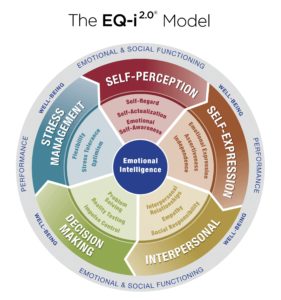Emotional Intelligence (EQ) Assessments Put To Work

MICHELE BURCH REID, MS FOUNDER OF LCI
One of my favorite strategies to use for Organizational Effectiveness and Personal Development is Emotional Intelligence Training.
Emotional Intelligence is a set of emotional and social skills that influence the way we perceive and express ourselves, develop and maintain social relationships, cope with challenges, and use emotional information in an effective and meaningful way.
The EQ-i 2.0 measures emotional intelligence (EI) and how it can impact people and the workplace by measuring our mastery of 15 skills. These 15 skills are divided into 5 categories/composites.
5 Composites of Emotional Intelligence
Self-Perception: How well you know yourself. This scale reveals how confident you are, how well you know and recognize your own emotions, and what influences them, as well as how willing you are to learn more about yourself and your emotional influences.
Self-Expression: How well you express yourself. It assesses your potential and ability to remain self-directed and openly expressive thoughts and feelings while communicating these feelings in a constructive and socially acceptable way.
Interpersonal: How well you manage relationships. This composite measures our ability to develop and maintain relationships based on trust and compassion; articulate an understanding of another’s perspective; and act responsibly while showing concern for others, a team, or a greater community/organization.
Decision Making: How well you use emotional information in the decision-making process. This scale reveals how well we understand the impact emotions have on decision making, including the ability to resist or delay impulses and remain objective so to avoid rash behavior and ineffective problem-solving.
Stress Management: How well you cope with emotions associated with change and unfamiliar or unpredictable circumstances while remaining hopeful about the future and resilient in the face of setbacks and obstacles.
The best part is that all of these Emotional Intelligence Skills can be completely learned, developed, and coached. I have seen the power of doing so. It is one of my greatest joys to see the impact that Emotional Intelligence training makes on my clients. It truly changes their lives in the most powerful and meaningful ways. I’ve seen clients take their power back because they have learned to set and keep boundaries in healthy ways. I’ve seen clients lead teams in greater capacities and in more joyful connections because they have learned the power of empathy. And the list goes on and on.
More From Michele
What’s the best personality type match for my romantic relationship?
With Valentine’s day approaching, I thought it would be timely to revisit Personality Types as they relate to relationships. The most common question I have received in all the years doing workshops and coaching on Personality Type and Emotional Intelligence in the...
Using Personality Type To Set Your New Year’s Resolution
If you are like most people, you have the best intentions to set a resolution for the New Year. However, sticking to it is a struggle. Or for some, even deciding what to resolve in the first place is a struggle. Here are some suggested focus areas for setting new...
Introverted Feeling (FI)
Introverted Feeling (FI) ISFJ - INFJ The function is making decisions based on your personal values and being concerned more with how things impact you personally than how the group is impacted. Uses personal, deeply held values to ensure an inner sense of...




